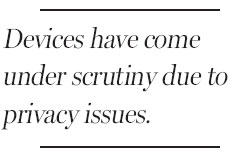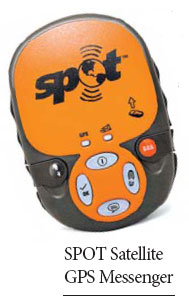GPS, for the wandering and the wayward
Updated: 2012-11-18 07:59
(The New York Times)
|
|||||||||
The other day, I slipped a GPS tracking device into my wife's car. I put another tracker in my 2-year-old's diaper bag and sent him off to the nanny. I still had a few trackers left, so I also threw one into my parents' vehicle while they took my son out to the park.

My spying was meant only as an experiment, but I still felt guilty.
These small gadgets work by connecting to GPS satellites and cellular networks to follow subjects and report back their locations. I could look up the trackers online, either on the Web or through a smartphone app. They could also be configured to send alerts. If my wife's car left her office parking lot during the day or my parents' vehicle broke the speed limit, I might get a text alert.
There are defensible uses for such devices. Some parents use trackers to make sure their children get to school and back safely. There's the elder-care market. And don't forget the dog: a tracker can let you know if it wanders out of your yard.
Among the companies offering devices is Amber Alert GPS, founded by a businessman who temporarily lost his 3-year-old at an amusement park. Its tracker looks a bit like a pager. Carol Colombo, the chief executive, said most customers buy the device for children between the ages of 2 and 10 - old enough to be mobile, but too young to carry a cellphone. Still, with a press of a button, your child can send a text or initiate a voice call with you, and you can also dial in to the tracker and listen to his surroundings.

I found the Amber Alert extremely simple to set up and use. The company's Web site, which allows you to configure and monitor the tracker, is well designed and intuitive, and its iPhone and Android apps also work well. Amber Alert offers more customizable alert settings than any other child-tracking system I tested: there's an option to receive an alert each time your child comes within 150 meters of an address on a sex-offender database.
The device sells for $200, and it requires a service plan, which is $14.99 a month for basic tracking features, and $24.99 a month with extras, including voice-calling and sex-offender alerts.
Securus eZoom is slightly larger than the Amber Alert and doesn't have some of that device's features, but it is cheaper. The eZoom sells for $99.99, and its monthly plan is $19.99. If you pay for two years at once, the price drops to $12.99 a month.
Securus also makes the eCare for seniors who need medical help. In addition to tracking, it has a button that initiates a voice call to an emergency call center. The eCare sells for $99.99, with a $29.99-a-month service plan.
There also is a GPS device designed for keeping track of yourself. The SPOT Satellite GPS Messenger, which sells for $119.99 and requires a $99-a-year contract, is meant for adventurous types who routinely wander far off the grid. If you find yourself in an emergency in a place without any cellphone connectivity, you can alert rescuers to your location. You can also send a message letting your friends know you're fine and they can track your progress on a map. The SPOT has led to dozens of rescues.

Securus and Amber Alert services allow you to monitor multiple trackers. The chief executives of both companies argue that GPS tracking can help parents avoid acting overly protective. It's difficult for some parents to get over the fear of letting their children wander out into the world. A GPS tracker can help parents conquer that anxiety.
Amber Alert and Securus both recommend that parents don't hide the trackers from their children. The trackers work best if children know that they can use them to alert their parents during an emergency. Privacy becomes more important to children as they get older. "If the parents have a deal - 'You can use my car if we put a locator on it, and if you ever get in a bind, I'll know exactly where you are' - most teenagers won't mind that," said Chris Newton, the chief executive of Securus.
Neither Amber Alert nor Securus markets its devices to people who are looking to invade other people's privacy. Both require at least a yearlong service contract, but why sign up for a year if you only want to track your straying spouse's whereabouts for the next few weeks?
With that customer in mind, Rocky Mountain Tracking, a GPS firm that mainly sells trackers to companies looking to monitor their fleet vehicles, recently created a monthly rental plan for its personal tracking device, called Ghost Rider. For $99.95 a month, you'll get the device and a service plan without a contract. You can use the device however you wish as long as you obey the law.
"We probably rent out 10 to 12 devices a month, and we don't ask any questions," said Gary Whitney of Rocky Mountain.
"Occasionally I'll get a person - usually it's the wife - who feels guilty about doing it." Then he added, "But not so guilty that they don't go ahead and get the device."
The New York Times
(China Daily 11/18/2012 page11)